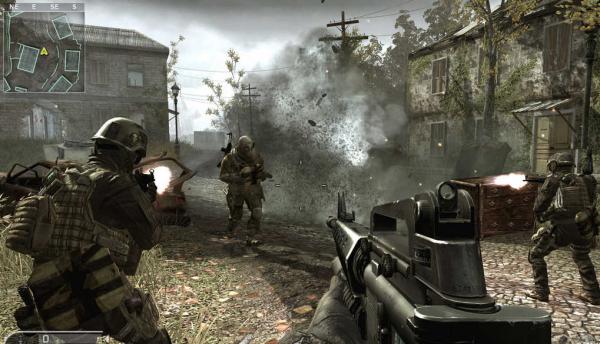Ten Surprising Facts About Video Game Violence - TechAddiction
Main menu:
By Dr. Brent Conrad
Clinical Psychologist for TechAddiction
 As long as video games have existed there has also been violence in video games.
As long as video games have existed there has also been violence in video games.
From the earliest beginnings of electronic entertainment in the 1950s (the first video game ever was a Tic-Tac-Toe game using cathode-ray tubes), to the first commercial video game ("Computer Space" in 1971), to the hyper-realistic first person shooters of today, violence in video games has always existed…and probably always will.
Over the past few decades (and especially during the last ten years), researchers have given more attention to studying the effects of video game violence on those who enjoy this form of electronic entertainment.
The main question asked by these studies is usually quite simple:
"Does violence in video games increase violence and aggression in the real world?"
Despite sensational media stories warning of dire consequences for those who play violent video games, are these predictions actually justified by the research?
As is often true of new / developing fields of research, the answer to this question is not as straightforward as early studies may have suggested.
Even though violence in video games has been studied for more than three decades, the conclusions drawn seem to depend on:
1. The definition of "video game violence"
2. The group being studied (e.g., children, teens, or adults)
3. How large the effect should be before it is considered clinically significant
4. The particular research group conducting the study Some individuals and groups are certain that violence in video games actually causes people to become more violent, angry, and aggressive in the real world. They argue that video game violence desensitizes players to actual violence, teaches them that physical aggression is the preferred problem solving approach, and causes them to act on violent thoughts that they otherwise would have ignored. Some groups believe that violent video games should be banned (although such a ban has been ruled unconstitutional). Media reports placing sole blame on violence in video games for school shootings would be just one example of this particular viewpoint.
Some individuals and groups are certain that violence in video games actually causes people to become more violent, angry, and aggressive in the real world. They argue that video game violence desensitizes players to actual violence, teaches them that physical aggression is the preferred problem solving approach, and causes them to act on violent thoughts that they otherwise would have ignored. Some groups believe that violent video games should be banned (although such a ban has been ruled unconstitutional). Media reports placing sole blame on violence in video games for school shootings would be just one example of this particular viewpoint.
On the other hand, there are also those who are sure that video game violence has absolutely zero impact on gamers. According to this side, millions of people play violent video games every day…and yet they are not out shooting, killing, beating, or car-jacking others in real life.
Not surprisingly, the true (but more complicated) answer falls in between these two extremes.
By examining published articles on violence in video games (and not choosing the research that only supports one's particular biases), a number of conclusions can be made:
1. Right after playing violent video games, young children are more likely to demonstrate physical aggression in a free play environment. This is a short term effect.
2. When there is an effect, compared to girls, boys appear to be more affected by violence in video games.
3. If a study on video game violence is conducted in a highly controlled laboratory environment (as compared to studies in a more natural environment) it is more likely to find that the violence is harmful to the player.
4. There is very little support for the theory that video game violence causes adults to become more aggressive or violent in real life.
5. Rather than exposure to violence in video games, a person's natural level of aggression (trait aggression) is a superior predictor of future violent behaviors.
6. There may be a publishing bias in favor of studies highlighting the harmful effects of video game violence (compared to those that do not find a negative impact).
7. Violence in video games does appear to affect the level of a player's physiological arousal (e.g., brain activity, breathing and heart rate, and galvanic skin response).
8. Those who are naturally more aggressive, angry, or violent are more attracted to violent video games. The connection between violence in video games is not necessarily unidirectional.
9. The majority of gamers believe that video game violence has few, if any harmful effects on them personally.
10. Compared to violence in video games, repeated exposure to television violence may actually be more harmful to children.
Note: For the complete story on each of these conclusions, be sure to read the full individual articles on the effects of violence in video games.
Violence In Video Games - The Non-Biased Facts
Related & recommended pages on this topic:
Thank you for visiting TechAddiction! We hope you find the info here helpful.
Please take just 1 second to click the "Like" button.
Many thanks - we really appreciate it!
COMMENTS
Share your thoughts. Do you play violent video games?
Do you think that they have any impact on who you are or what you do?